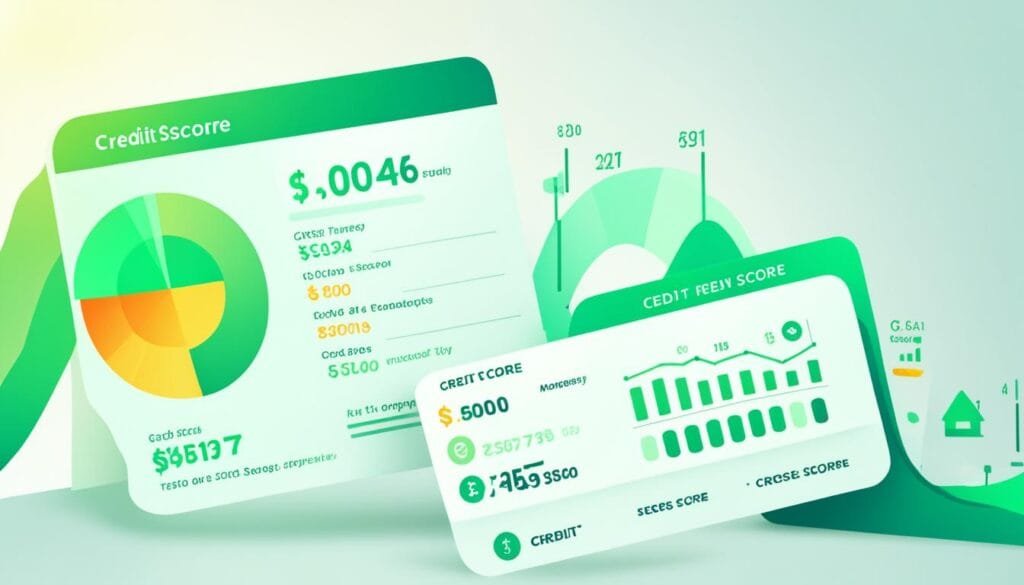Imagine this: You’ve been diligently working to improve your credit score for months. You’ve followed all the tips and advice you could find, hoping to repair your credit and pave the way for a brighter financial future. But despite your efforts, your credit score remains stagnant, and it feels like you’re hitting a dead end.
Sound familiar? Many individuals find themselves in this frustrating situation, unsure of what else they can do to improve their creditworthiness. But fear not! There are effective credit score building strategies that can help you break through the barriers and achieve the credit score you desire.
Today, we will explore key strategies that can make a significant impact on your credit score. From understanding how credit scores are calculated to utilizing credit builder loans and monitoring your credit report, you’ll discover actionable tips to elevate your credit profile. Let’s dive in!
Key Takeaways:
- Understanding credit score factors is essential for credit score improvement.
- Paying before your statement closing date can positively affect your credit utilization ratio.
- Adding rental payments and utility bills to your credit report can showcase your on-time payment history.
- Setting up automatic payments can help you consistently make on-time payments.
- Utilizing credit builder loans and secured credit cards can be effective for building credit history.
How Credit Scores are Calculated
Credit scores are calculated using complex algorithms that consider several key factors. Understanding these factors is essential in comprehending how your credit score is determined. Here are the main components that contribute to your credit score:
- Payment History: Your payment history plays a significant role in determining your credit score. It carries the most weight, accounting for about 35% of the score. Lenders want to see a consistent record of on-time payments, which reflects your reliability in managing credit obligations.
- Credit Utilization: Credit utilization measures the ratio of available credit to the amount you actually use. It makes up around 30% of your credit score. Keeping your credit utilization low, ideally below 30%, indicates that you aren’t heavily reliant on credit and are effectively managing your finances.
- Length of Credit History: The length of your credit history also influences your credit score. It takes into account how long you have been using credit and how recently you have utilized credit. A longer credit history provides more data for lenders to assess your creditworthiness and stability, contributing positively to your score.
- Credit Mix: Your credit mix considers the types of credit accounts you have, such as credit cards, mortgages, loans, etc. A diverse credit mix shows lenders that you can responsibly handle various types of credit, which can boost your credit score.
- New Credit Applications: Opening multiple new credit accounts within a short period can negatively impact your credit score. Each new application generates a hard inquiry on your credit report, which can lower your score temporarily. It’s important to minimize unnecessary credit applications to maintain a strong credit profile.
Now that you understand the key credit score factors, you can take proactive steps to improve your creditworthiness. By focusing on maintaining a positive payment history, keeping your credit utilization low, cultivating a lengthy credit history, diversifying your credit mix, and being mindful of new credit applications, you can enhance your credit score and unlock better financial opportunities.
Paying Before Your Statement Closing Date
Managing your credit card payments is essential for maintaining a healthy credit score. One strategy that can positively impact your creditworthiness is paying off a portion or the entire balance on your credit card before the statement closing date.
By making on-time payments and managing your credit utilization, you can effectively improve your credit score. Paying your credit card bill before the statement closing date enables you to lower your reported credit utilization ratio, which is the percentage of your available credit that you are currently using.
When your credit card statement closes, the issuer reports the balance to credit bureaus, who then calculate your credit utilization ratio based on that information. By paying before the statement closing date, you can ensure that a lower balance is reported, leading to a lower credit utilization ratio.
A lower credit utilization ratio is beneficial for your credit score. It indicates that you are responsibly using your available credit and not relying heavily on borrowed funds. Lenders often view a lower credit utilization ratio as a positive sign of creditworthiness, which can increase your chances of being approved for credit in the future.
Additionally, paying before the statement closing date demonstrates your commitment to making on-time payments. Prompt payment history is a significant factor in calculating your credit score. By consistently making on-time payments, you establish a solid credit history, boosting your overall creditworthiness.
Take control of your credit score by proactively managing your credit card payments. Paying off a portion or the entire balance before the statement closing date can have a significant impact on your credit utilization ratio, positively influencing your credit score and opening doors to better financial opportunities.
Remember, responsible credit management and on-time payments are key to building a strong credit profile and securing a brighter financial future.
Adding Rental Payments and Utility Bills to Your Credit Report
When it comes to building a strong credit profile, it’s essential to consider all aspects of your financial activity. In addition to regular credit cards and loan payments, there are other recurring expenses that can work in your favor. By reporting your rental payments and utility bills to credit bureaus, you have the opportunity to enhance your credit profile and improve your credit score.
Several rent reporting services and credit monitoring platforms offer the option to include your rent payments and utility bills in your credit report. One such service is Experian Boost, a leading provider known for its innovative approach to credit reporting.
Experian Boost allows you to connect your bank account and verify your payment history for rent and utility bills. This information is then added to your credit report, showcasing your responsible financial behavior. By demonstrating your consistent and on-time payments, you can potentially boost your credit score and increase your chances of getting approved for credit in the future.
In addition to Experian Boost, another popular option is FreedomPath. This service works with property management companies and utility providers to report your rental payments and utility bills to credit bureaus. By using FreedomPath, you can build a more comprehensive credit history that reflects your responsible payment habits.
Adding rental payments and utility bills to your credit report can provide creditors and lenders with a more complete picture of your financial behavior. It shows that you are not only managing traditional credit accounts but also handling your everyday expenses responsibly.
Benefits of Adding Rental Payments and Utility Bills to Your Credit Report
1. Enhanced Credit Profile: By including your rental payments and utility bills in your credit report, you can demonstrate a history of responsible financial behavior and improve your creditworthiness.
2. Improved Credit Score: With a positive payment history reflected in your credit report, you have the potential to increase your credit score and access better credit opportunities.
3. Expanded Credit History: Adding rental payments and utility bills to your credit report helps create a more comprehensive credit history that showcases your ability to manage various financial responsibilities.
4. Better Loan and Credit Card Approval Odds: By establishing a strong credit profile through the inclusion of rental payments and utility bills, you increase your chances of getting approved for loans and credit cards at favorable terms and conditions.
Comparison of Rent Reporting Services
| Service | Features | Cost |
|---|---|---|
| Experian Boost | Connects to your bank account to include rental payments and utility bills in your credit report | Free |
| FreedomPath | Collaborates with property management companies and utility providers to report rent payments and utility bills | Varies (depends on the property management company) |
By utilizing rent reporting services such as Experian Boost and FreedomPath, you can make the most of your recurring expenses and strengthen your credit profile. It’s important to note that adding rental payments and utility bills to your credit report is optional, but it can provide significant benefits in terms of credit score improvement and creditworthiness.

Setting up Automatic Payments
Consistency in payments is essential for maintaining a strong credit profile. Late payments can have a negative impact on your creditworthiness and financial well-being. Enrolling in automatic payments is a simple and effective way to ensure that your bills are paid on time, every time.
By setting up automatic payments, you eliminate the risk of forgetting to make a payment or experiencing unexpected circumstances that may hinder your ability to pay on time. Automatic payments offer convenience and peace of mind, allowing you to focus on other important aspects of your financial life.
Not only do automatic payments guarantee timely payments, but they also demonstrate responsible credit management to lenders and financial institutions. Consistently making payments by the due date showcases your commitment to meeting your financial obligations, improving your creditworthiness in the eyes of potential lenders.
The Benefits of Automatic Payments
Automatic payments provide several advantages that can positively impact your creditworthiness and overall financial well-being:
- Consistency: With automatic payments, you can maintain a consistent payment schedule, reducing the risk of late payments and associated fees.
- Convenience: Automated payments save you time and effort by handling the payment process for you, eliminating the need to manually initiate each payment.
- Reduced stress: By removing the worry of forgetting or missing payments, automatic payments alleviate financial stress and allow you to focus on other important aspects of your life.
- Improved credit score: Timely payments contribute to a positive payment history, which is a crucial factor in determining your credit score.
“Setting up automatic payments is a valuable tool for maintaining financial stability. Consistency in payments demonstrates your commitment to meeting financial obligations and improves your creditworthiness.”
To set up automatic payments, simply contact your creditors or service providers and inquire about their automatic payment options. They will guide you through the setup process and help you establish a schedule that aligns with your financial needs.

Comparing Different Automatic Payment Methods
| Automatic Payment Method | Benefits |
|---|---|
| Direct Debit | Allows automatic deduction of funds from your bank account, ensuring timely payments. |
| Online Bill Pay | Enables you to schedule payments through your bank’s online banking platform, providing flexibility and control. |
| Automatic Credit Card Payments | Automatically charges your credit card for recurring bills, simplifying the payment process. |
In conclusion, setting up automatic payments is a proactive step towards financial stability and improving your creditworthiness. By consistently making on-time payments, you demonstrate responsible credit management and increase your chances of accessing favorable credit opportunities in the future.
Utilizing Credit Builder Loans and Secured Credit Cards
Credit builder loans and secured credit cards are two effective tools for building or rebuilding credit. These options provide individuals with limited or poor credit history an opportunity to demonstrate creditworthiness and improve their credit scores.
Starting with credit builder loans, this financial product allows borrowers to make payments while the borrowed amount is held in an account. Essentially, the borrower is repaying themselves, which helps establish a positive payment history. As payments are made on time and in full, the borrower’s credit score can gradually increase. This type of loan is a fantastic option for individuals who want a structured and disciplined approach to building credit.
On the other hand, secured credit cards require a cash deposit that serves as collateral. The credit limit is typically equal to the deposit amount, reducing the risk for lenders. By responsibly utilizing the secured credit card, making regular payments, and maintaining a low credit utilization ratio, individuals can showcase their creditworthiness and improve their credit scores over time. Secured credit cards provide an opportunity to learn responsible credit practices without the risk of accumulating excessive debt.
Both credit builder loans and secured credit cards serve as stepping stones toward building a positive credit history. They provide individuals with limited or poor credit history a chance to prove their creditworthiness, allowing them to access better borrowing opportunities in the future.
Comparison between Credit Builder Loans and Secured Credit Cards
| Credit Builder Loans | Secured Credit Cards |
|---|---|
| Payments held in an account | Cash deposit serves as collateral |
| Structured approach to credit building | Opportunity to learn responsible credit practices |
| Positive payment history boosts credit score | Regular payments and low credit utilization ratio improve credit score |
By utilizing credit builder loans and secured credit cards responsibly, individuals can lay a solid foundation for their credit history and work towards achieving a stronger credit score. These tools not only assist in accessing better loan terms and interest rates but also pave the way for overall financial success.
Monitoring Your Credit and Disputing Errors
Regularly monitoring your credit report and using automated credit monitoring services can play a vital role in maintaining a healthy credit profile. It allows you to stay informed about any potential errors, inaccuracies, or signs of fraudulent activity, which, if left unaddressed, have the potential to negatively impact your credit score. By proactively monitoring your credit report, you can take prompt action to rectify any issues and safeguard your financial future.
One effective way to monitor your credit report is to sign up for credit report monitoring services. These services provide regular updates and alerts, notifying you of any changes or new information added to your credit report. This proactive approach ensures that you are always aware of your credit status and can address any potential problems before they escalate.
“Regular credit report monitoring is like having a watchful eye on the financial aspects of your life, allowing you to protect your creditworthiness and ensure accuracy in your credit report.”
In addition to monitoring your credit report, it’s crucial to be vigilant for any errors or inaccuracies. Even a minor error, such as an incorrect payment status or account balance, can have a significant impact on your credit score. If you notice any discrepancies, it’s essential to take immediate action to dispute and rectify them.
Dispute Process
If you identify an error on your credit report, initiate the dispute process promptly to ensure its correction. Here are the key steps to follow:
- Contact the credit bureau: Reach out to the credit bureau that reported the error and provide them with detailed information about the discrepancy. This may include documentation such as bank statements, payment receipts, or any other relevant evidence that can support your claim.
- Dispute the error in writing: It’s important to submit your dispute in writing, outlining the specific details of the error and attaching any supporting documents. Clearly explain why you believe the information is incorrect and request its removal or correction.
- Follow up regularly: Stay proactive and keep track of your dispute by following up regularly with the credit bureau. Request updates on the progress of your dispute and ask for written confirmation once the error has been rectified.
By monitoring your credit report regularly and taking prompt action to dispute any errors or inaccuracies, you can ensure the accuracy of your credit profile. This diligence is crucial in maintaining a strong credit score and maximizing your financial opportunities.
Remember, credit report monitoring and the dispute process are essential practices for every individual looking to actively manage and improve their creditworthiness. Incorporating these strategies into your financial routine will help safeguard your credit profile and provide you with peace of mind.
How Can Setting Credit Score Targets Help in Building a Better Credit Score?
Setting credit score targets can greatly help individuals achieve success with credit score. By establishing specific goals, people can track their progress and take necessary actions to improve their credit. Whether it’s paying off debts or making timely payments, having clear targets can make a significant difference in building a better credit score.
Conclusion
By implementing these effective credit score building strategies, you can take control of your financial health and pave the way for a brighter credit future. Understanding how credit scores are calculated and the factors that contribute to them is crucial in improving your creditworthiness.
One of the key strategies is to ensure on-time payments, as your payment history carries the most weight in determining your credit score. Additionally, managing your credit utilization ratio by paying off a portion or the entire balance on your credit card before the statement closing date can positively impact your credit score.
Furthermore, consider adding rental payments and utility bills to your credit report through services like FreedomPath and Experian Boost. This allows you to showcase your on-time payment history and further enhance your credit profile.
Don’t forget the importance of consistent payments. Setting up automatic payments for your bills can help you avoid late payments and demonstrate responsible credit management to lenders and financial institutions.
Utilizing credit builder loans and secured credit cards are also effective ways to build or rebuild your credit history. These tools provide opportunities to make timely payments, ultimately boosting your credit score and increasing your creditworthiness.
Lastly, regular credit monitoring is crucial. By monitoring your credit report and promptly addressing any errors or inaccuracies, you can maintain a strong credit profile and prevent negative impacts on your credit score.
Start implementing these strategies today to take control of your financial future and witness your credit score soar to new heights.
FAQ
How are credit scores calculated?
Credit scores are calculated using complex algorithms that consider factors such as payment history, credit utilization, length of credit history, credit mix, and new credit applications.
How can paying before the statement closing date affect my credit score?
Paying off a portion or the entire balance on your credit card before the statement closing date can lower your reported credit utilization ratio, positively impacting your credit score.
Can rental payments and utility bills affect my credit score?
Yes, some services allow you to report your rent payments and utility bills to credit bureaus, effectively boosting your credit score by showcasing your on-time payment history.
Why is setting up automatic payments important for my credit score?
Enrolling in automatic payments ensures that your bills are paid on time consistently, reducing the risk of late payments. This can greatly improve your creditworthiness and demonstrate responsible credit management.
What are credit builder loans and secured credit cards?
Credit builder loans involve making payments while the borrowed amount is held in an account, ultimately boosting your credit score upon successful repayment. Secured credit cards, backed by a cash deposit, allow for responsible use and payments that can positively impact your credit score.
How can I monitor my credit and dispute errors?
Regularly monitoring your credit report and using automated credit monitoring services can help catch errors, potential fraud, or inaccuracies early, preventing them from negatively impacting your credit score. If you spot any errors, promptly initiate the dispute process with credit bureaus to ensure accuracy and maintain a strong credit profile.
Source Links
- https://www.graygroupintl.com/blog/credit-score-improvement
- https://www.linkedin.com/pulse/unveiling-20-hidden-strategies-skyrocket-your-credit-score-effinger-jiyuc?trk=article-ssr-frontend-pulse_more-articles_related-content-card
- https://www.linkedin.com/pulse/credit-mysteries-unveiled-7-surprising-factors-shaping-effinger-0hppe

